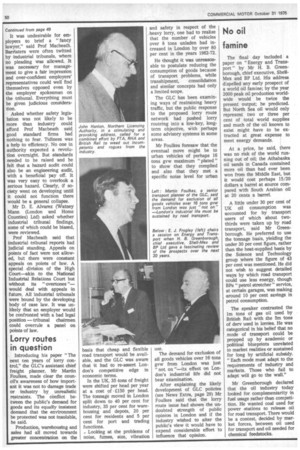Lorry routes in question
Page 52

If you've noticed an error in this article please click here to report it so we can fix it.
Introducing his paper "The next ten years of lorry control," the GLC's assistant chief freight planner, Mr Martin Foulkes, made clear the council's awareness of how important it was not to damage trade or industry by .unrealistic restraints. The conflict between the public's demand for goods and its equally insistent demand that the environment be protected was not insoluble, he said.
Production, warehousing and sales had all moved towards greater concentration on the basis that cheap and flexible road transport would be available, and the GLC was aware that it had to re-assert London's competitive edge in economic terms.
In the UK, 35 tons of freight were shifted per head per year at a cost of • E150 per head. The tonnage moved in London split down to 40 per cent for industry, 35 per cent for warehousing and depots, 20 per cent for residents and 5 per cent for port and trading functions.
Looking at the problems of noise, fumes, size, vibration and safety in respect of the ,heavy lorry, one had to realise that the number of vehicles over 8 tons unladen had increased in London by over 80 per cent in the years 1962-72.
He thought it was unreasonable to postulate reducing the consumption of goods because of transport problems, while transhipment, consolidation and similar concepts had only a limited scope.
The GLC has been examining ways of restraining heavy traffic, but the public response to the proposed lorry route network had pushed lorry routeing into a low-key, longterm objective, with perhaps some advisory systems in some areas.
Mr Foulkes foresaw that the eventual move might be to urban vehicles of perhaps 16 tons gvw maximum " plated " to show that they complied and also that they met a specific noise level for urban use.
The demand for exclusion of all goods vehicles over 16 tons gvw from London was just "not, on "—its effect on Landon's industrial life did not bear examination.
After explaining the likely development of GLC policies (see News Extra, page 29) Mr Foulkes said that the lorry route issue had shown the undoubted strength of public opinion in London and if the industry wished to alter the public's view it would have to expend considerable effort to influence that opinion.
































































































